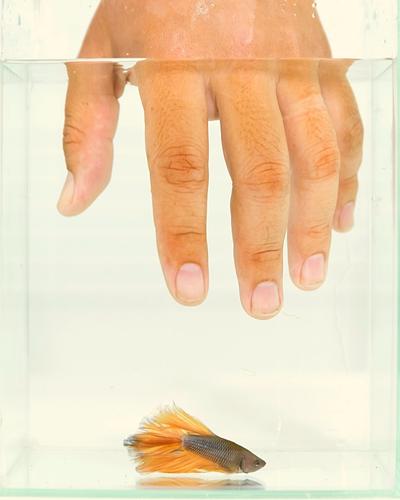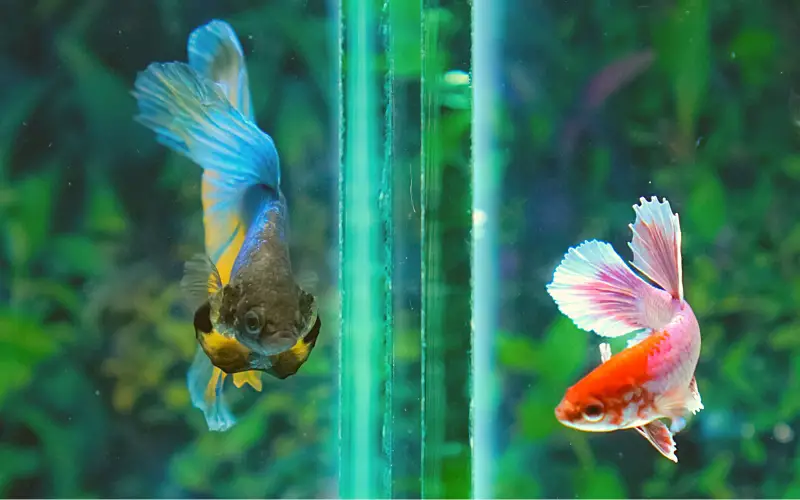Betta fish, or Siamese fighting fish, are popular pets for their vibrant colors and long, flowing fins. Unfortunately, many betta fish are neglected and mistreated, leading to declining health and well-being. Better Betta Fish Rescue has emerged as a beacon of hope for these beautiful creatures in response to this issue.
Rescuing betta fish is a non-profit organization dedicated to rescuing and rehabilitating neglected betta fish. Their mission is to provide a safe and nurturing environment for these fish and educate the public about proper betta fish care.
With the help of dedicated volunteers and Betta Keepers, the organization works tirelessly to give neglected betta fish a second chance at a happy and healthy life.

Through their efforts, Better Betta Fish Rescue is giving hope to individual fish and raising awareness about the importance of responsible pet ownership.
The organization hopes to inspire positive change and create a brighter future for these beloved pets by shining a light on the plight of neglected betta fish.
Table of Contents
ToggleShould You Rescue Betta Fish From Stores?
If you have experience and knowledge in caring for betta fish, rescuing them from stores can be a good option. Many bettas are kept in small cups or tanks in pet stores, and their living conditions could be better.

By rescuing a betta from a store, you can provide them with a larger, adequately maintained tank and proper care. However, it’s essential to consider whether you have the time, resources, and knowledge to care for a betta fish before deciding to rescue one.
Betta fish have specific needs and require proper care to thrive. If you are up for the challenge and can provide a good home for a betta, rescuing one from a store can be a rewarding experience.
Where can you adopt a betta fish?
There are many places in the United States where you can adopt a betta fish. Here are a few options:
- Pet stores: Many pet stores, such as Petco and PetSmart, have surrendered or rescued betta fish. These fish are often in good health and have been well cared for.
- Fish rescues: Many fish rescues across the United States specialize in rescuing and rehoming betta fish. These rescues can be a great option if you are looking for a specific type of betta fish or want to adopt a fish that has been in a less-than-ideal situation.
- Online adoption websites: Several online adoption websites list betta fish that are available for adoption. These websites can be a great way to find a betta fish in your area.
Here are some tips for adopting a betta fish:
- Do your research. Before you adopt a betta fish, it is essential to do your research and learn about the care requirements of these fish. Bettas are relatively easy to care for but have specific needs that must be met.
- Ask questions. When you are at the pet store or fish rescue, ask questions about the betta fish you are interested in adopting. Find out where the fish came from, how long it has been at the store or rescue, and any health problems it may have.
- Set up a tank. Before you bring your new betta fish home, set up a tank for it. Bettas need a tank that is at least 2.5 gallons in size, but a larger tank is always better. The tank should be filled with conditioned water and should have a heater and filter. You should also provide your betta fish with some hiding places and live plants.
- Introduce your betta fish to its new home. When you are ready to introduce your betta fish to its new home, do so slowly and carefully. Float the bag that the fish came in in the tank for about 15 minutes to allow the water temperatures to equalize. Then, gently open the bag and let the fish swim into the tank.
Southwest Michigan Betta Rescue
Southwest Michigan Betta Rescue is a small, locally run rescue specializing in rescuing ill or mistreated bettas, rehabilitating them, and finding them forever homes. They are operating out of Southwest Michigan, but they have also added rescue partners in the eastern and northern parts of the state.
On their Facebook page, you can find more information about Southwest Michigan Betta Rescue, including their adoption process and contact information.
Betta Fish Rescue (The Betta Sanctuary)
The Betta Sanctuary is an organization dedicated to providing a safe and nurturing environment for Betta fish that have been neglected, abandoned, or mistreated. These organizations work tirelessly to rescue Betta fish from unfit living conditions and rehabilitate them with proper care and attention.
The Betta Sanctuary, in particular, houses rescued Betta fish in spacious tanks with clean water, adequate filtration, and proper nutrition. The staff at these organizations are passionate about offering these beautiful fish a second chance at life and are committed to finding them loving homes forever.
Through education and outreach, Betta Fish Rescue and The Betta Sanctuary also aim to raise awareness about the proper care and treatment of Betta fish, encouraging responsible ownership and humane treatment of these creatures.
5 Tips for Rescuing Betta Fish
Rescuing betta fish can be a rewarding experience, giving these beautiful creatures a second chance at a happy life. Here are 5 tips to help you make the process smooth and successful:
1. Do your research:
- Before bringing home a rescue betta, research their specific needs. Learn about ideal water parameters (temperature, pH), tank setup, feeding requirements, and joint health issues.
- Research the rescue organization you’re considering adopting from. Understand their adoption process, any fees involved, and the support they offer new owners.
2. Prepare a quarantine tank:
- Even if the Betta appears healthy at the rescue, it’s crucial to have a separate quarantine tank ready. This prevents the spread of potential diseases to other fish you may have.
- Set up the quarantine tank with a heater, filter, and thermometer. Ensure the water is conditioned and at the appropriate temperature for bettas (around 78-80°F).
3. Acclimate the Betta slowly:
- Once you bring your betta home, don’t immediately release them into the quarantine tank. Instead, float the sealed bag they came in in the tank for 15-20 minutes to allow the water temperatures to equalize.
- Open the bag slightly and add a small amount of quarantine tank water every 5 minutes for another 15-20 minutes. This gradual acclimatization reduces stress on the fish.
4. Monitor the Betta closely:
- Keep a close eye on your rescued Betta for any signs of illness, such as lethargy, loss of appetite, fin clamping, or unusual swimming behavior. Early detection and treatment of any issues are crucial for their recovery.
- Offer a varied and nutritious diet of betta pellets, flakes, frozen bloodworms or brine shrimp.
5. Provide a stimulating environment:
- Bettas, despite their reputation for being solitary, enjoy exploring and enrichment. Decorate the quarantine tank with live or silk plants, hiding places, and even a betta hammock.
- Consider offering interactive toys, like floating mirrors or colorful rings, to keep your Betta engaged and mentally stimulated.
Following these tips gives your rescued betta fish the best chance to thrive in their new home. Remember, patience, care, and a loving environment can make all the difference in their lives.
How Long Do Betta Fish Live?
The lifespan of a betta fish can vary depending on its living conditions and overall care. In the wild, betta fish typically have an average lifespan of about 2-3 years. However, when properly cared for in captivity, betta fish can live anywhere from 3-5 years and even up to 7 years in some cases.
Factors such as tank size, water quality, diet, and genetics all play a role in the longevity of betta fish. It is crucial to provide a suitable environment and regular maintenance to ensure a betta fish can live a long and healthy life.
By keeping their tank clean, providing a balanced diet, and monitoring their behavior, betta fish owners can help ensure their pets live to their fullest potential.
Recommended betta adoption Supplies List
Essentials:
- Tank: Minimum 5 gallons (larger is better!) – rectangular or cube shape preferred.
- Heater: Maintains proper water temperature (78-80°F).
- Filter: Provides water circulation and removes waste. Choose one appropriate for tank size and flow rate suitable for bettas.
- Thermometer: Monitors water temperature accurately.
- Water conditioner: Neutralizes chlorine and chloramines present in tap water.
- Gravel or substrate: Choose smooth, rounded gravel or sand to avoid injuring delicate fins.
- Decorations: Live or silk plants provide hiding spots and enrichment. Driftwood and artificial decorations can also be used.
- Hiding places: Caves, rocks, or betta hammocks offer security and stress reduction.
- Siphon and bucket: For regular water changes (25% weekly).
- Net: For safely scooping out your Betta or debris.
- Food: High-quality betta pellets or flakes as the main diet. Supplement with frozen bloodworms, brine shrimp, or daphnia for variety.
- Light: Optional, but provides a day/night cycle. Choose low-intensity LED lights suitable for freshwater aquariums.
Additional (Optional):
- Test kit: Monitors water parameters like pH, ammonia, nitrite, and nitrate.
- Air pump and airstone: This can be helpful for additional water oxygenation, especially in smaller tanks.
- Feeding ring: Reduces food waste and keeps pellets from scattering.
- Water thermometer strips: Quick and convenient way to check water temperature.
- Decorative items: colored rocks, figurines, etc. (avoid sharp edges).
Things to avoid:
- Small bowls or vases: Need more space and better water quality.
- Gravel vacuums: Powerful suction can injure bettas.
- Artificial plants with sharp edges.
- Unconditioned tap water: Chlorine and chloramines harm fish.
- Overfeeding: This can lead to health problems.
Remember: Choose products designed explicitly for betta fish needs. Research and adjust the list based on your tank size, budget, and preferences.
This list is a starting point to create a healthy and enriching environment for your rescued Betta. Your tiny friend can thrive in its new home with proper care and love!
Commonly Asked Questions about Betta Adoption (FAQs)
Are betta fish happy in a small tank?
Small tanks (less than 5 gallons) can stress and bore betta fish. They need room to swim, explore, and hide. Aim for at least 5 gallons for a happier, healthier betta.
Do Betta Fish Need a Heater and Filter in Their Tank?
Yes! Bettas thrive in warm, stable water (78-82°F). Heaters & filters provide this, plus clean water & waste removal. Skip them at your Betta’s peril!
How to Increase Bettas Lifespan?
To extend a Betta’s lifespan, maintain a clean tank with proper water conditions, feed a balanced diet, regulate water temperature, provide enrichment, and conduct regular health checks.
Can Betta Fish Live With Other Fish in a Community Tank?
Maybe! While Betta can be territorial, peaceful fish like neon tetras & shrimp can thrive in a spacious (10+ gallon), well-planted community tank. Monitor closely & remove if aggression arises. Choose tank mates wisely!
Have a sick betta fish and need rehabilitation?
For a sick Betta fish, isolate it in a quarantine tank, address water quality issues, administer appropriate medications, and provide a stress-free environment. Consult a vet or seek advice from experienced aquarists.
How do I know if my betta fish died?
Identify a dead fish by observing its lack of movement, unresponsiveness, and potential color changes. Look for signs of decay, such as a pale appearance or an unpleasant odor.
Conclusion
In conclusion, betta fish rescue is a noble and vital endeavor for those passionate about animal welfare. By rescuing betta fish, individuals can provide a second chance for these beautiful creatures and offer them a better quality of life. Betta Rescue also helps combat pet abandonment and allows for the opportunity to educate others about proper care for these fish. Those interested in betta adoption can take part in this rewarding journey by adopting a betta fish rather than buying one from a store.
By doing so, they offer a safe and loving home for a betta in need and contribute to preventing the pet trade and the mistreatment of these animals. Overall, betta fish rescue and adoption play a vital role in promoting responsible pet ownership and ensuring the wellbeing of these fascinating aquatic creatures.
You might also like
- Female Betta Fish Sorority Tank 101: (A Comprehensive Guide)
- How to Clean Fish Tank After Betta Dies (Here’s What To Do!)
- How to Help a Dying Betta Fish? (7 Reasons Your Bettas Die)
- Do Betta Fish Float When They Die? Top 5 Reasons Bettas Die!
- Why Did My Betta Fish Die Suddenly? Top 9 Reasons (Revealed)
- Betta Velvet Disease 101: Symptoms, Treatment & Prevention
- Effective Popeye in Betta Treatments: (Tips and Tricks)
- Betta Fish Diseases Columnaris: Symptoms, Treatment, and Prevention!
- 10 Best Betta Fish Plants in Tank: (A Comprehensive Guide)
- Keeping Betta Fish and Neon Tetra Together: (Do’s & Don’ts)




